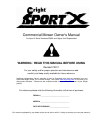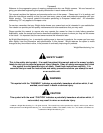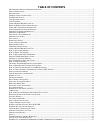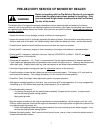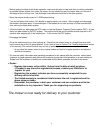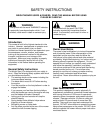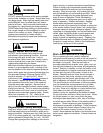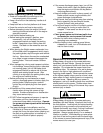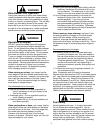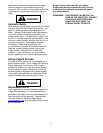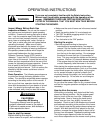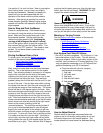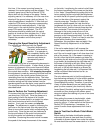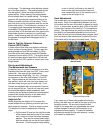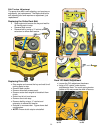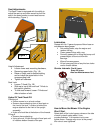
7
Initial Operating Safety Guidelines
• Read and understand the warnings on the
instrument panel of the mower.
• Keep a firm hold on the stationary handle at all
times.
• Keep both feet on the foot platform at all times.
• Know the controls and how to stop quickly.
• Before attempting to start the engine, follow all
starting instructions below and in the engine
operator’s manual.
• Look behind before backing up.
• Before leaving the operator’s position, even
momentarily, turn off the blade clutch
engagement switch and apply the parking
brake. Keep others from coming near the
mower. Get back on the mower as soon as
possible.
• When leaving the Wright mower unattended, turn
off the blade clutch engagement switch, apply
the parking brake, stop the engine and remove
the key. Never leave the machine unattended
on a slope in case someone disengages the
parking brake. This could create a rollover
hazard.
• When transporting, driving onto transport vehicles,
into buildings, across parking lots or otherwise
not mowing grass, turn off the blade clutch
engagement switch to reduce risk of thrown
objects and rotating blade hazard. After
coming to a stop apply the parking brake, stop
the engine and remove the key.
• Before performing any maintenance or repair
service, disengage power to blades, apply the
parking brake, stop the engine, remove
ignition key and spark plug wire from spark
plug(s).
• All operators of this mower should exercise
caution when driving this mower at high
speeds. Sudden acceleration or deceleration
may cause serious injury.
• DO NOT allow inexperienced persons to operate
the mower until they have read and
understood these safety instructions. Operate
the mower at slower speeds while becoming
familiar with it.
• The grass discharge chute deflector must be
installed at all times and in the down position
except that it may be raised when cleaning out
the deck or a grass catcher is installed or a
mulch kit and block-off plate is properly
installed.
• If the mower discharges grass clogs, turn off the
blade clutch switch, apply the parking brake,
stop the engine and remove the key before
removing obstruction(s).
• Keep all shields and covers in place, namely, all
blade and belt covers, engine shields, and
grass discharge chute deflector.
• Keep hands, feet and clothing away from rotating
parts, especially the rear wheels, blades,
engine flywheel, belts and pulleys.
• Do not touch engine, muffler or hydraulic system
while engine is running or soon after it is
stopped. These areas can be so hot as to
cause severe burns.
• Clean grass, leaves and lubricant spills from
surfaces after use to prevent fire hazard.
• Be alert for traffic when crossing roads or
operating near roadways.
• Before climbing curbs, crossing gravel drives,
sidewalks or roads, turn off the blades and
wait for them to stop.
Operation In Forward Direction
Always keep a firm grip on the mower stationary
handlebar with both hands. Operate the mower
slowly until you become familiar with how the mower
operates. Do not operate the mower faster than
conditions allow. For example, hills, wet or bumpy
ground, dim light or high grass are all conditions
requiring slower speeds. Never operate the mower
at the highest speed unless you are on level, wide,
open areas of clearly visible ground or transporting
on paved areas. Speeding with any mower is
dangerous, and so is traveling faster than conditions
should permit on this mower. Sudden stops from
excessive speed or falling off the mower may cause
serious injury or death.
Operation In Reverse
Always keep a firm grip on the mower stationary
handlebar with both hands. Keep both feet firmly on
the foot platform. Look behind you before backing
to prevent injuring yourself or anyone behind you.
Operate the mower very slowly, inching it backward
until you become familiar with how the mower
operates. Always operate slowly if in an awkward
location or position. While backing up never place
your foot or feet on the ground near the back edge
of the mower to prevent serious personal injury if the
mower were to run over you.
WARNING
WARNING
WARNING



